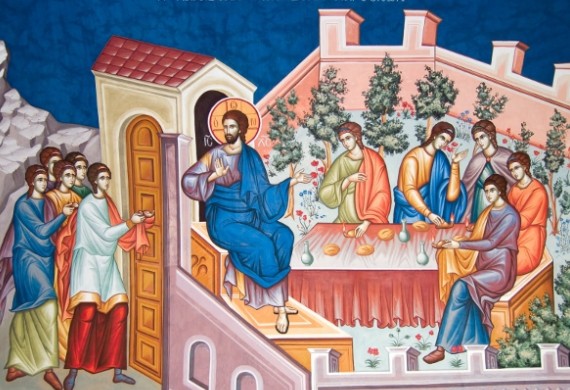On Great Tuesday, our Church remembers the Parable of the Ten Virgins and advises us to follow the example of the five wise ones; to have lit the lamp of faith and virtue, to have a good supply of the oil of good works and to be alert towards our meeting with the Bridegroom Christ “since I, O Christ the Bridegroom, have permitted my soul to slumber in indolence”. This is also stressed by the ever so sweet hymn of the Praises, “I do not possess a torch aflame with virtue, and like the foolish Virgins, I meditate when it is the time of work. Close not against me, O Master, Your compassionate heart: but rouse me up to shake off my heavy sleep. and do You bring me in with the wise virgins to Your bridal chamber, where there is the pure song of those who feast and unceasingly cry; O Lord, glory to You”…
On Great Tuesday morning at the Pre-Sanctified Gifts’ Liturgy the Gospel lesson of the Parable of the Talents is read out. In this way the hymnology of the day advises us to be careful, that what happened to the evil servant who hid the talent, his master gave him, in the ground, will not happen to us, but rather to cultivate properly whatever gifts and talents God has given us. Thus following the example of the diligent servants who received the five and two talents and doubled them.
At the same moment on the horizon appears the dark shape of Judas, the son of bereavement. He has started to move, to approach the enemies of the Teacher, to promise the betrayal and to agree to the shameful exchange. “Judas in his mind is greedy, disgracefully he moves against the Teacher, he decides, he studies how to hand Him over, he falls from the light, accepting darkness: he agrees to the price, he sells the Priceless One….”. The hour of the most horrible ingratitude and the most wretched betrayal since the beginning of the world approaches…
On Great Tuesday evening we perform the Matins Service of Great Wednesday. In front of us is projected the form of a woman; a prostitute. The prostitute who shortly before the Passion approached Christ at the house of Simon the Pharisee, fell down at His feet sobbing, wet His feet with the burning tears of repentance, anointed them with a very expensive perfume and wiped them with the tresses (locks of hair) on her head (as the divine Matthew describes in the Gospel which is read the next day at the Pre-Sanctified Liturgy).
Almost all the hymns of the day underline the wondrous repentance of this woman and the love she showed to the Saviour. They make parallels between her, a shameful woman who in the end finds Christ and falls in the ocean of His love and is saved, and Judas who having Christ, the treasure of life, betrays Him for 30 pieces of silver; among the honourable kisses which the former prostitute gave to the immaculate feet of Christ and the dishonourable kiss of betrayal which the former disciple and friend gave Him! The repentance which takes someone out of the mud and hell of sinfulness is praised, and the laziness and the soul destroying greed which guided Judas to ingratitude and betrayal are condemned.
The climax of the day’s hymnody is the famous Doxasticon of the Aposticha of Matins, the one known to all as the Troparion of Saint Kassiani, the great poetess and hymnographer of our Church: “The woman who had fallen into many sins, perceiving Your divinity, O Lord, fulfilled the part of a myrrh-bearer; and with lamentations she brought sweet-smelling oil of myrrh to You before Your burial. ‘Woe to me’, she said, ‘for night surrounds me, dark and moonless, and stings my lustful passion with the love of sin: Accept the fountain of my tears, You who gather into the clouds the waters of the sea. Incline to the groaning of my heart, You who in Your ineffable self emptying have bowed down the heavens. I shall kiss Your most pure feet and wipe them with the hairs of my head, those feet whose sound Eve heard at dusk in Paradise, and hid herself in tear. Who can search out the multitude of my sins and the abyss of Your judgements, O my Saviour and soul saver? Do not despise me Your servant, for You have measureless mercy!”
What can one marvel in this first of all? Is it the poetic greatness, the beauty of the literary contrasts. the lyricism, the wealth of imagery end sentiment, or the depth of theology? One thing is certain, millions of souls have been moved throughout the centuries in which it has been chanted, millions of eyes have been moved to tears and many have been brought to compunction and repentance…
BY METROPOLITAN JOSEPH OF PROIKONESSOS

